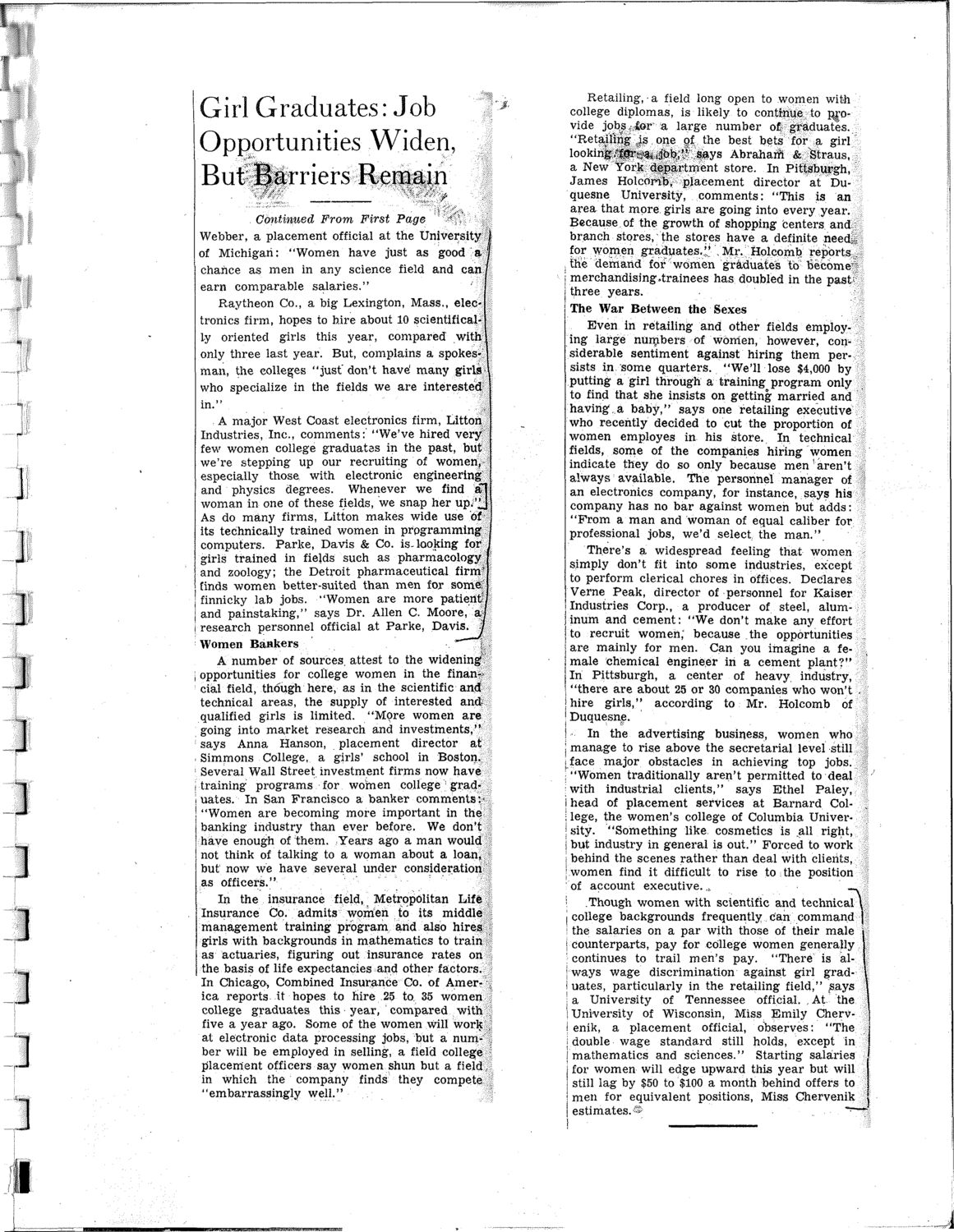| |
| |
Caption: SWE - News Clippings Book
This is a reduced-resolution page image for fast online browsing.

EXTRACTED TEXT FROM PAGE:
Girl Graduates: Job Opportunities Widen, But Barriers Remain Continued From First Page Webber, a placement official at the University \ of Michigan: "Women have just as good a j chance as men in any science field and can earn comparable salaries." Raytheon Co., a big Lexington, Mass., electronics firm, hopes to hire about 10 scientifically oriented girls this year, compared with only three last year. But, complains a spokes-' man, the colleges "just' don't have' many girls who specialize in the fields we are interested A major West Coast electronics firm, Litton Industries, Inc., comments: "We've hired very few women college graduates in the past, but we're stepping up our recruiting of women, especially those with electronic engineering and physics degrees. Whenever we find a woman in one of these fields, we snap her up. As do many firms, Litton makes wide use of its technically trained women in programming computers. Parke, Davis & Co. is-looking for girls trained in fields such as pharmacology and zoology; the Detroit pharmaceutical firm' finds women better-suited than men for some, finnicky lab jobs. "Women are more patient and painstaking," says Dr. Allen C. Moore, a research personnel official at Parke, Davis Women Bankers A number of sources, attest to the widening ; opportunities for college women in the financial field, though here, as in the scientific and technical areas, the supply of interested andqualified girls is limited. "More women are going into market research and investments," 1 says Anna Hanson, placement director at : Simmons College, a girls' school in Boston. ! Several Wall Street investment firms now have | training programs for women college graduates. In San Francisco a banker comments: "Women are becoming more important in the banking industry than ever before. We don't have enough of them. Years ago a man would not think of talking to a woman about a loan, but now we have several under consideration as officers." In the insurance field, Metropolitan Life Insurance Co. admits worrien to its middle management training program and also hires girls with backgrounds in mathematics to train as actuaries, figuring out insurance rates on the basis of life expectancies and other factors. In Chicago, Combined Insurance Co. of America reports it hopes to hire 25 to 35 women college graduates this year, compared with five a year ago. Some of the women will work at electronic data processing jobs, but a number will be employed in selling, a field college placement officers say women shun but a field in which the company finds they compete "embarrassingly well." a J ] J J J ] ] .] .] 1 Retailing, a field long open to women with college diplomas, is likely to continue to provide jobs lor a large number of graduates. "Retailing js one of the best bets for a girl lookingIWrvtkSbb,'.' S#ys Abraham' & Straus, a New York department store. In Pittsburgh, James Holcomb, placement director at Duquesne University, comments: "This is an area that more girls are going into every year. Because of the growth of shopping centers and branch stores, the stores have a definite needfor women graduates." Mr. Holcomb reports the demand for women graduates to become!" merchandising .trainees has doubled in the past;' three years. The War Between the Sexes Even in retailing and other fields employing large nunjbers of women, however, considerable sentiment against hiring them persists in.'some quarters. "We'll lose $4,000 by putting a girl through a training^ program only to find that she insists on getting married and having"..a baby," says one retailing executive who recently decided to cut the proportion of women employes in his store. In technical fields, some of the companies hiring women indicate they do so only because men 'aren't always available. The personnel manager of an electronics company, for instance, says his company has no bar against women but adds: "Prom a man and woman of equal caliber for professional jobs, we'd select the man.". There's a widespread feeling that women simply don't fit into some industries, except to perform clerical chores in offices. Declares Verne Peak, director of personnel for Kaiser Industries Corp., a producer of steel, aluminum and cement: "We don't make any effort to recruit women; because the opportunities are mainly for men. Can you imagine a female Chemical engineer in a cement plant?" In Pittsburgh, a center of heavy, industry, "there are about 25 or 30 companies who won't . hire girls," according to Mr. Holcomb of Duquesne. In the advertising business, women who manage to rise above the secretarial level still Lface major obstacles in achieving top jobs. j "Women traditionally aren't permitted to deal ; with industrial clients," says Ethel Paley, i head of placement services at Barnard Coli lege, the women's college of Columbia Univer| sity. "Something like, cosmetics is all right, j but industry in general is out." Forced to work j behind the scenes rather than deal with clients, i. worn en find it difficult to rise to the position of account executive. „. _ I Though women with scientific and technical \ j college backgrounds frequently can command j the salaries on a par with those of their male i | counterparts, pay for college women generally i continues to trail men's pay. "There is al- I | ways wage discrimination against girl gradI uates, particularly in the retailing field," says j a University of Tennessee official. , At the I University of Wisconsin, Miss Emily ChervI enik, a placement official, observes: "The double wage standard still holds, except in mathematics and sciences." Starting salaries for women will edge upward this year but will still lag by $50 to $100 a month behind offers to men for equivalent positions, Miss Chervenik estimates.® *^~
| |